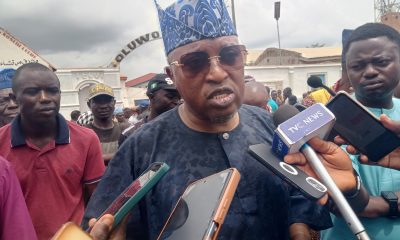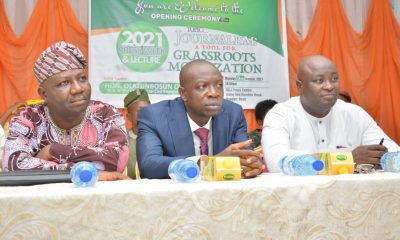News
Assessment Of Hazards On The Prospects Of Journalism In Nigeria By Sheriff Olamiji Jeje

Journalism can be described as day to day activities or operation of gathering and transmitting of a news or information to a large audience through a suitable media or channel. It can also be regarded as the events of the day condensed into few words, sounds or pictures to satisfy the human curiosity of a world that is always interested in knowing what is new (long man dictionary 1984).
The introduction of journalism and its media, electronic and print, have a lot to do in reducing the rate of ignorance in the society, from the general observation both media have been disseminating information to the general publics.
Read Also:Osun NUJ Praises Oyetola For Appointing Seasoned Journalist, Oyesiku Adelu As Coordinating Director
Journalists in Nigeria therefore, are those that practice journalism worldwide, they are always in problem each time they disseminate the news story that is against important personalities, most especially politicians.
The media is the bridge between the government and the governed as well as the mouthpiece of the society. a basic duty of the media professionals in every society is to be a civic watchdog whose mission is to uncover secrets, issues and keep the government accountable to the society.
Hazards in journalism, according to Wikipedia, is anything that can cause harm or damage to life, health property or the environment. Consequently, hazard in journalism sphere refers to the various dangers and challenges facing journalists.
Journalism Feeds Public with Accurate Information
The media has its goals: to inform, educate and entertain the public. So, the need for accurate information has thus become imperative in an age and time where much fake news are pedled by people who are desirous of cheap publicity or causing harm through social media platforms. We need journalism to bring us unadultered information.
Freedom of Speech
Freedom is speech is facilitated by journalism: – by gathering stories and making them available to people accordingly. Sometimes journalism expresses the opinions of the masses just as the explain the policy of the leaders.
Journalism fill the void, acting as the mediator for the freedom of speech of individuals whose voices have been reduced to whispers by poverty, illiteracy, fear and all things which hold down a common man.
Journalism is a precursor for social change. Several revolutions around the world have been catalyzed by journalism. Journalism continues to draw the attention of the people to the issues which need fixing.
Being a journalist can be quite interesting. One can work on many different projects about the people. Journalism in Nigeria has continued to grow immensely in line with global trends despite strong infrastructural challenges.
Similarly, communicating with a mass audience is not totally strange in Nigeria, however, there are several factors hindering the effectiveness of the media and information dissemination
Santa’s and ogoshi (2015) opined that factors like corruption, poor communication channels, illiteracy, inadequate infrastructure, poor implementation framework and political instability. These have continued to pose great challenges to the attainment of the Sustainable Development Goals in Nigeria.
Otolo (2015) highlighted ownership as one of the major problems facing the media in Nigeria, be it state or federal. In most cases, there is a stigma on journalists who work in these media houses as they are often seen as governments propagandists. Journalists are made to give the activities of their governments owner more prominence at the expense of other important issues when they fail to do so,, regardless of their role or importance to the media organization, the reporters risk being sacked or demoted unless they are lucky.
National Identity
Despite the hyperbole that exists in our society today about what is or what may not be fake news, journalism plays a strong part in forming our national identify in Nigeria.
Development Journalism
Development journalism is another challenge to journalism. It may not be new but it is still a novelty in Nigeria since we are yet to embrace its potentialities.
Importance of the media is any society cannot be over emphasized and through the advent of technology the world has become a global village. Through media performs, the role of teaching, informing, educating and entertaining the public, in addition to encouraging socio economic and political development in nations of the world Nigeria inclusive, has becomes almost everyone’s responsibility. It is not an overstatement that Nigeria media give prominence to politics and business issues while reportage on development is scarcely covered therefore, affecting the development and growth of the nation.
Attraction of development journalism has a lot of implications for developing countries. In countries where poverty is rife, the government of the day wants and needs as much support as it can get. Government can probably have to take decisions which are based on the common good but which harm individual liberties. These decisions may be highly Unpopular but they have to be taken.
Consequently, a hostile press can hold back government’s progress while a supportive press could help government push these policies ahead.
This follows one of the definitions or the duties of a journalist who is reporting on development to critically examine, evaluate and report the relevance of a development project to national and local needs. Odugberi and Norri have said development journalism often faces obstacles in the form of low professional journalistic standards, a lack of financial resources, technical skills, fragmented legal frameworks and an undemocratic political system.
Risk of patronage
The media may not be able to break free from its political constraints and may operate according to clentelism or be captured by private intervals. The digital age has made it difficult to defining the role of the professional journalism vis a vis the citizen journalism (the receiver who is at the same time, the producer of news). Today, journalism is not just by standers watching and evolving avalanche of disinformation and misinformation .
they find themselves in its pathway. This means that journalism faces the risk of being drowned out by the cacophony.
A journalist risk being manipulated by actors who go beyond the ethics of public relations by attempting to mislead or corrupt journalists into soreading disinfirmatiin.
Journalists whatever their political learnings, should avoid inadvertently and uncritically spreading disinformation and misinformation.
in most news media today, the elimination of positions and providing internal fact checking has to an extent led to the function now being assumed by the fifth estate “of bloggers and other external actors who call out mistakes made by journalists, through after they already disseminated.
This emergent phenomenon can be welcomed by mass media as reinforcing society’s interest in verifiable information. Journalists should bring the work of independent facts checking groups to larger audiences, but they should know that where external actors demonstrate systematic failure in given news outlet, this puts a question mark over the institutions branded as a professional source of news. The media should be careful that external post publication, corrections do not become a substitute for internal processes of quality control. Journalists have to do better and “get it right in the first place, or frit the possibility of a society to have believable media.
This is aided by transparency and explicit application of ethical standards. Journalism distinctive role today lies in its capacity to contribute clarity and build trust around ethics.
Accuracy: journalists cannot always guarantee “truth” but being accurate and getting the facts right remains a cardinal princilple of journalism.
Independence: journalist must be independent.
Voices: this means not acting, formally or informally on behalf of special interests and declaring anything that might constitute a conflict of interest.
In the interest of transparency:
transparency in practice supports accountability and assists in the development and maintenance of trust in journalism.
By Sheriff Olamiji Jeje is a student of School of Social Science at ICON Universal Polytechnic
-

 Education4 days ago
Education4 days ago150 CHEW & JCHEW Graduates of OSCO-HEALTH, Ilesa Inducted into Nigeria’s Community Health Practitioners Board
-

 News4 days ago
News4 days agoCourt Dismisses Suit Challenging Appointment Of Alawo Of Awo, Awards ₦1m Costs
-

 News4 days ago
News4 days agoWoro Massacre: Oluwo Reacts To Low Sympathy, Cautions Tinubu Against Trump’s Intervention
-

 News4 days ago
News4 days agoBomb Explosion Rocks Bayelsa Secretariat








